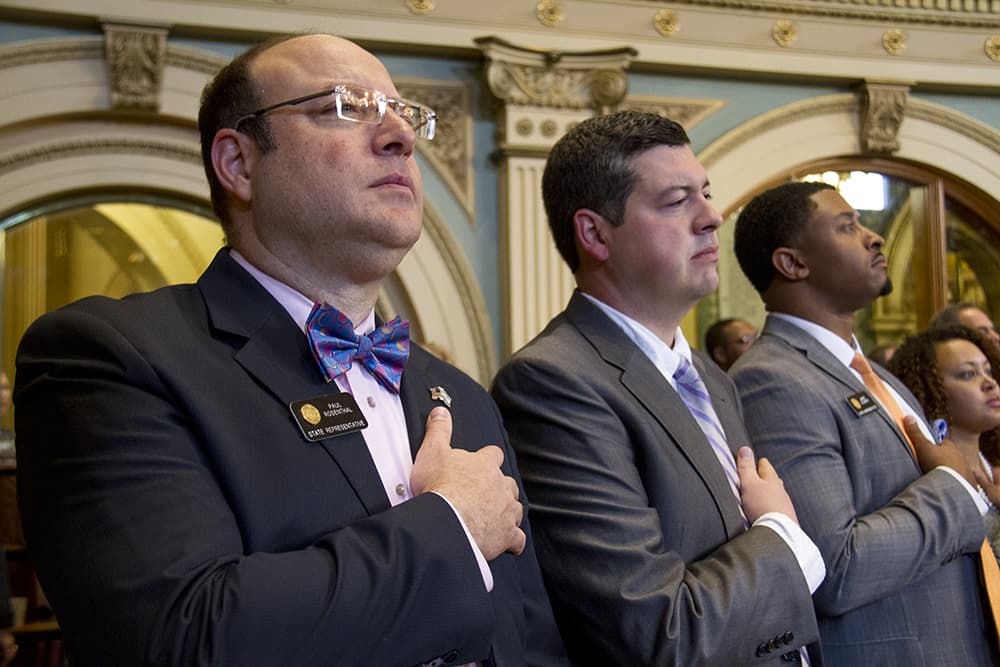
State Rep. Paul Rosenthal, the incumbent Democrat in southeast Denver, is in danger of losing his next election before it begins.
Rosenthal turned in the worst performance of three candidates in one of the early tests in the House District 9 election. If he doesn't drum up new supporters in the next couple weeks, he'll be left off the Democrats' primary ballot, leaving the race to challengers Emily Sirota and Ashley Wheeland.
What happened:
Democrats gathered at county assemblies on Saturday to choose delegates, an important step in determining which candidates will be allowed to participate in the primary elections. (The primaries determine who will be the party's candidate in the general election.)
Wheeland dominated in House District 9, picking up commitments from 47 percent of the district's delegates, according to her campaign manager. Sirota came in section with 28 percent, while Rosenthal came in third with 25 percent.
"You know, these assemblies are always a bit unpredictable," Rosenthal told Denverite
It's a serious problem for Rosenthal, but not an insurmountable one. He now has less than two weeks to undo the damage and convince several delegates to switch to his side. If he doesn't, he'll be knocked out of the race.
"I’m getting to know them now," the six-year incumbent said. "... I’m building relationships with people who I haven’t met before."
What's next:
On April 7, those delegates will go to yet another assembly and vote on the House 9 candidates. If Rosenthal doesn't get 30 percent of their votes, he won't be allowed on the primary ballot. He'll need to swing four delegates to his side to make it, according to figures provided by Wheeland's campaign and confirmed by the other campaigns
The other two candidates have a much lower bar.
That's because they're going the "petition route," meaning they have been collecting signatures in support of their campaigns. As long as their signatures are validated, they only have to pick up 10 percent of the delegate vote, which is practically guaranteed. (Democracy, so simple.)
"Rep. Rosenthal is in trouble. It’s very unusual. He put himself in this position," said Scott Merrifield, campaign manager for Sirota.
And he said that Rosenthal had a steep climb back onto the ballot. "We fired up a lot of people," he added.
Kristen Seidel, communications director for Wheeland, said that her candidate wouldn't be giving up delegates either.
"We’re very confident that our delegates are Ashley's delegates. They believe that she is who is going to fight with them," Seidel said, adding that Wheeland had knocked on thousands of doors.
Rosenthal's platform:
We previously profiled Wheeland and Sirota. On Tuesday, Rosenthal laid out his own case.
"What I’ve noticed is, with the great energy and enthusiasm we have in the Democratic Party today, which is really super awesome, we’re also getting a lot of new people in, which is also super awesome," he said.
"Some of those folks don’t know me or my six years of progressive leadership in southeast Denver or 20 years of involvement in this area. I think they’re just getting to know me."
If re-elected, he said he would continue trying to pass a bill banning "gay conversion" therapy, a longtime goal of LGBT advocates. (His fourth attempt is headed to the Senate, where it will likely be defeated again.)
He also named affordable housing as a critical need. This year, he sponsored a bill that would have put a 25-cent tax on plastic bags, directing the money to affordable housing. It did not pass.
Rosenthal also touted his personal connections to the community. "Probably more than anyone at the legislature, I am excellent at bringing people to the Capitol, to invite people who normally wouldn’t come, to invite people to be recognized for the wonderful things they do in the community," he said.
Rosenthal was the subject of a sexual harassment complaint; he has denied the allegation. The complaint was dismissed by Democratic House Speaker Crisanta Duran, who said it was outside the Capitol's sexual harassment policy.
Asked whether it had affected his campaign, Rosenthal said he was working on building relationships so people could get to know him.
"I'm looking forward to April 7 and to hopefully earning my way on my ballot," he said.













